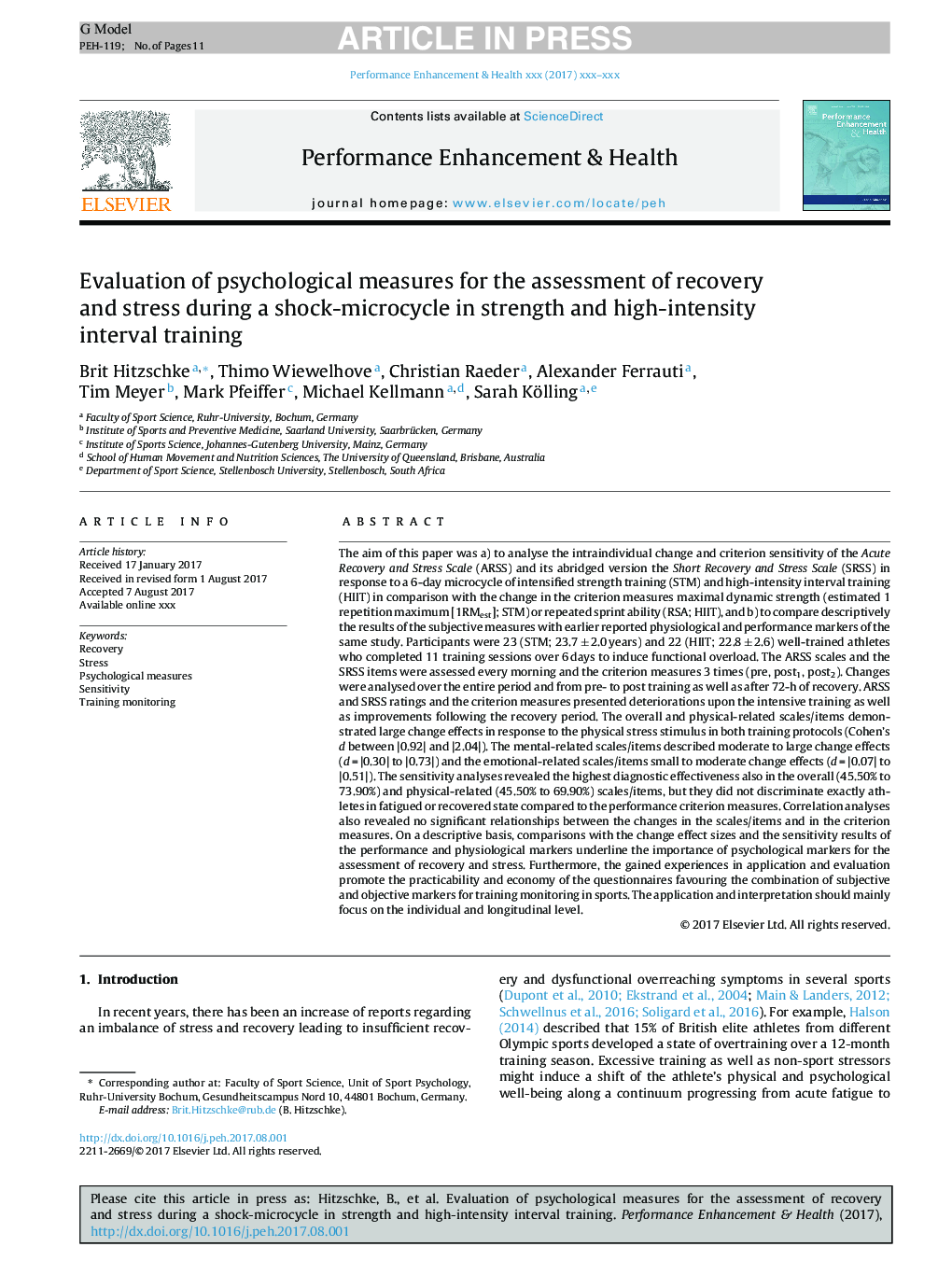| کد مقاله | کد نشریه | سال انتشار | مقاله انگلیسی | نسخه تمام متن |
|---|---|---|---|---|
| 7248310 | 1471975 | 2017 | 11 صفحه PDF | دانلود رایگان |
عنوان انگلیسی مقاله ISI
Evaluation of psychological measures for the assessment of recovery and stress during a shock-microcycle in strength and high-intensity interval training
ترجمه فارسی عنوان
ارزیابی اقدامات روانشناختی برای ارزیابی ریکاوری و استرس در طی یک شوک-میکرو سایکل در آموزش شدت و تمرین پرش با شدت بالا
دانلود مقاله + سفارش ترجمه
دانلود مقاله ISI انگلیسی
رایگان برای ایرانیان
کلمات کلیدی
بهبود، فشار، اقدامات روانشناختی، حساسیت، نظارت آموزشی،
موضوعات مرتبط
علوم زیستی و بیوفناوری
علم عصب شناسی
علوم اعصاب (عمومی)
چکیده انگلیسی
The aim of this paper was a) to analyse the intraindividual change and criterion sensitivity of the Acute Recovery and Stress Scale (ARSS) and its abridged version the Short Recovery and Stress Scale (SRSS) in response to a 6-day microcycle of intensified strength training (STM) and high-intensity interval training (HIIT) in comparison with the change in the criterion measures maximal dynamic strength (estimated 1 repetition maximum [1RMest]; STM) or repeated sprint ability (RSA; HIIT), and b) to compare descriptively the results of the subjective measures with earlier reported physiological and performance markers of the same study. Participants were 23 (STM; 23.7 ± 2.0 years) and 22 (HIIT; 22.8 ± 2.6) well-trained athletes who completed 11 training sessions over 6 days to induce functional overload. The ARSS scales and the SRSS items were assessed every morning and the criterion measures 3 times (pre, post1, post2). Changes were analysed over the entire period and from pre- to post training as well as after 72-h of recovery. ARSS and SRSS ratings and the criterion measures presented deteriorations upon the intensive training as well as improvements following the recovery period. The overall and physical-related scales/items demonstrated large change effects in response to the physical stress stimulus in both training protocols (Cohen's d between |0.92| and |2.04|). The mental-related scales/items described moderate to large change effects (d = |0.30| to |0.73|) and the emotional-related scales/items small to moderate change effects (d = |0.07| to |0.51|). The sensitivity analyses revealed the highest diagnostic effectiveness also in the overall (45.50% to 73.90%) and physical-related (45.50% to 69.90%) scales/items, but they did not discriminate exactly athletes in fatigued or recovered state compared to the performance criterion measures. Correlation analyses also revealed no significant relationships between the changes in the scales/items and in the criterion measures. On a descriptive basis, comparisons with the change effect sizes and the sensitivity results of the performance and physiological markers underline the importance of psychological markers for the assessment of recovery and stress. Furthermore, the gained experiences in application and evaluation promote the practicability and economy of the questionnaires favouring the combination of subjective and objective markers for training monitoring in sports. The application and interpretation should mainly focus on the individual and longitudinal level.
ناشر
Database: Elsevier - ScienceDirect (ساینس دایرکت)
Journal: Performance Enhancement & Health - Volume 5, Issue 4, June 2017, Pages 147-157
Journal: Performance Enhancement & Health - Volume 5, Issue 4, June 2017, Pages 147-157
نویسندگان
Brit Hitzschke, Thimo Wiewelhove, Christian Raeder, Alexander Ferrauti, Tim Meyer, Mark Pfeiffer, Michael Kellmann, Sarah Kölling,
